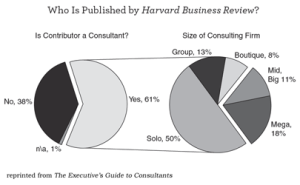Let’s face it, many reasons we say a client should hire us instead of a large consulting firm don’t hold water.
We’re smart; they’re smart too. We’re responsive; their project teams are responsive. We’re experienced; they’re experienced. We sing Christmas carols in the shower; they sing Christmas carols in the shower, in harmony. Maybe. I’m not sure about that last one.
Are there any legitimate reasons a client should eschew large consultancies? Yes.
Before I start whaling on big firms, let me say that I have tremendous admiration and respect for the consultants in giant, brand-name organizations. Seriously. They are smart, dedicated, well-trained and generally well-intentioned. And more of them should leave the nest and become cool, independents like us.
Okay, let the whupping begin.
When your clients and prospects are leaning toward hiring a large consulting firm instead of yours, it’s your duty to ensure they consider the following issues:
Economies of Snails
In a production economy, “economies of scale” were a key driver of success. In today’s knowledge economy bigger doesn’t mean better. Five hundred mediocre strategists do not have better ideas than a solo strategic genius. They just reach more people with their mediocre ideas.
Plus, large firms are slower to adopt new ideas and best practices than boutique consultancies. It takes far longer to migrate a killer, new approach or the learning from a project to 5,000 consultants than to five.
Brilliance Has Left the Building
The biggest names in innovative thinking regularly leave the confines of the large firms to form their own groups. Examples include Tom Peters and Clayton Christenson. Other gurus whose thinking has shaped the business environment never joined large consulting companies at all: Peter Drucker, Michael Hammer, and Stephen Covey, to name just a few.
A while ago I analyzed a year’s worth of Harvard Business Review articles to find out where thought leadership comes from. Over 70% of the contributors hailed from small, independent consulting firms. Only 18% of the contributors came from big name mega-consultancies.
Yeah, and Operators Were Important Too
Back in great-grandpa’s time folks depended on a telephone operator to dial for them. “Connect me to Burnsterberry 549 please.” Thanks to modern technology, we can call anyone, anywhere in the world with a few key presses (or by sitting on our phone). Operators would just be in the way.
Similarly, a few decades ago there was no easy way for a client to find the best consulting talent in the world for a particular problem, so they’d depend on a big firm to find brainiacs, train them and house them under one roof. Thanks to the internet, Google, and firms like Zintro, Elance and my own Ascendant Consortium, clients can find the ideal consultant anywhere in the world with a few key presses. Big firms aren’t a conduit to the best talent. They’re just in the way.
The Customer’s Always Right, But the Customer Ain’t Always You
Clients who hire independent consultants are generally working with an owner or partner at the consulting firm. The client’s opinion is the sole determinant of the consultant’s success on the project and it’s darn clear who the customer is: the client.
Clients who engage a team from a large firm are generally working with analysts, consultants, managers or maybe a vice president or junior partner. All of those people have bosses inside the consulting firm. Bosses who determine the consultant’s career trajectory and financial rewards. Bosses who need to be made happy. Hmm, who’s the customer now?
… add your “Defense” against large firms below.
The first four “defenses” were adapted from Chapter 6 of The Executive’s Guide to Consultants. (If you don’t have a copy yet, now’s a good time to pick one up!) But I want to hear yours.
What other issues should clients be aware of before they sign a contract with a large consulting firm?
Text and images are © 2024 David A. Fields, all rights reserved.

 David A. Fields Consulting Group
David A. Fields Consulting Group 





Insightful article Dave – loved point about who is the real boss – client or manager. I am in the process of hiring a TAMP for my start-up financial advisory practice. Deciding among 3 firms – big, boutique, and hybrid. Your article helped advance my thinking. Take Care. Dave
Glad this could help you as you search for your own consultant, Dave. Not sure what you mean by a “hybrid” firm and would be interested to hear your thoughts on that. Good luck with the new practice!
Good Morning, David.
A great defense for the Small Guy: the singular level of consumer intimacy. There’s nothing like it amongst us independent service providers. There’s no variation of departments (or servers) client info (financial, IP, etc) has to filter through. Just us.
Let’s face it: larger firms are targeted more by hackers. Unfortunate for them. Not so much for us.
Thanks for another weekly dose of your brilliance!
Exactly, Lacey. In my book I refer to this as direct access to the expert, and you’re absolutely right. Large firms add filters and, even when the client works directly with a consultant, that consultant was trained by someone who was trained by someone who is “expert” in a technique. When a boutique consultant works on a project, s/he is the expert. Thank you for contributing that excellent defense.
I would like to recommend David’s book. It will change the way you think about you practice, and might even help you earn more from each engagement.
BTW – I am not a member of his family, and do not get a commission. 🙂
Thank you for the generous recommendation, David! Of course, I’m glad you found the book useful; it definitely has a few twists on the traditional view of consulting and consultants.
Here is what I say to my clients who have long histories of hiring the biggest consulting firms.
As you know, my firm has helped you get the right people in the right roles.
If you hire one of the big firms again, you can’t be assured that they know how to put the right people in the right roles on your consulting team. How could you rely on the, to help build out your own team?
A compelling argument, Katharine, that works especially well because of the particular service you provide. I like your willingness to go to the core of their capabilities. Thanks for contributing your defense to the conversation.
It’s been about a year since I left a leadership position with EY. The central reason for leaving was that, as one of the most expensive consultants in our Firm, my clients could not afford to have me work in their engagements. As a result, 90% of the work was performed by my staff. While they are smart, insightful and talented young men and women, for the most part, the individuals doing the work had less than 10 years experience … And often less than five.
As the founder of my young (and growing) consulting firm, my clients get my 25 years of experience every time. They pay for my expertise, and get far more value in far less time than my EY team could possibly have delivered.
Sure … This is a cost to value equation. And I don’t like the notion of competing on price with my former Firm. But at the end of the day, clients recognize that in the end, the value a consultant delivers must far exceed costs. They understand that equation, and it works in Morgan Digital’s favor.
Congratulations on the move to independent consulting, David. It sounds like you’re off to an excellent start. The experience of your new, independent team is far deeper than the larger firms’ mixed bag of junior consultants, and that’s a tremendous value to clients.
Re the “value to cost” equation, I wonder whether you have more opportunity than you realize. “Far more value in far less time” doesn’t have to be a price play. Especially if you charge for value rather than for time (hours or days). Better pricing structures is one of the huge advantages small firms like yours and mine have over the big guys, even when our fees are higher.